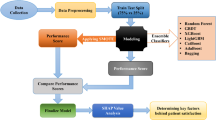Key Points
-
Consumer satisfaction, in its widest sense, is seen as being a complex process balancing consumer expectations with perceptions of the service or product in question.
-
The 'zone of tolerance' theory explains how consumers are able to recognise that service performance may vary along with the extent to which they are willing to accept this variation.
-
Similar mechanisms appear to play a role in the determination of patient satisfaction with healthcare, although this review suggests that the process is far from being a simplistic comparison between expectations and perceptions.
Abstract
Against a background of growing consumerism, satisfying patients has become a key task for all healthcare providers. This paper reviews current conceptual models of consumer satisfaction, including the one most dominant in the marketing literature — disconfirmation theory.
Similar content being viewed by others
Log in or create a free account to read this content
Gain free access to this article, as well as selected content from this journal and more on nature.com
or
References
Cardozo R . An experimental study of consumer effort, expectation and satisfaction. J Market Res 1965; 2: 244–249.
Peterson R . Measuring customer satisfaction: Fact and artifact. J Acad Market Sci 1992; 20: 61–71.
Patterson P, Johnson L, Spreng R . Modeling the determinants of customer satisfaction for business-to-business professional services. J Acad Market Sci 1997; 25: 4–17.
NHS Management Inquiry. London: Department of Health and Social Security, 1984.
Willson P, McNamara J . How perceptions of a simulated physician-patient interaction influence intended satisfaction and compliance. Social Sci and Med 1982; 16: 1699–1704.
Vuori H . Patient satisfaction - an attribute or indicator of the quality of care. Qual Rev Bull 1987; 13: 106–108.
Howard J, Sheth J . The theory of buyer behaviour. New York: Wiley, 1969.
Hunt H . CS/D — Overview and future research direction. In Hunt H (ed) Conceptualization and measurement of consumer satisfaction and dissatisfaction. Cambridge, MA: Marketing Science Institute, 1977.
Oliver R . A cognitive model of the antecedents and consequences of satisfaction decisions. J Market Res 1980; 17: 460–469.
Parasuraman A, Berry L . SERVQUAL: a multiple item scale for measuring consumer perceptions of service quality. J Retail 1988; 1: 12–40.
Bitner M, Hubbert A . Encounter satisfaction versus overall satisfaction versus quality. In Rust R, Oliver R (eds) Service quality: new directions in theory and practice. Thousand Oaks, CA: SAGE, 1994.
Zeithaml V, Bitner M . Services marketing. New York: McGraw-Hill, 1996.
Thompson A, Sunol R . Expectations as determinants of patient satisfaction: Concepts, theory and evidence. Int J for Quality in Health Care 1995; 7: 127–141.
Davidow W, Uttal B . Service companies: focus or falter. Harvard Bus Rev 1989 (July-August):; 77–85.
Boulding W, Kalra A, Staelin R, Zeithaml V . A dynamic process model of service quality. J Marketing Res 1993; 30: 7–27.
Olson J, Dover P . Disconfirmation of consumer expectations through product trial. J Applied Psychol 1979; 64: 179–189.
Festinger L . A theory of cognitive dissonance. Stanford, CA: Stanford University Press, 1957.
Anderson E . Cross-category variation in customer satisfaction and retention. Market Lett 1994; 5: 19–30.
Bolton R, Drew J . A multistage model of customers' assessment of service quality and value. J Consumer Res 1991; 17: 375–384.
Cadotte E, Woodruff R, Jenkins R . Expectations and norms in models of consumer satisfaction. J Market Res 1987; 24: 305–314.
Halstead D, Hartman D, Schmidt S . Multisource effects on the satisfaction formation process. J Acad Market Sci 1994; 22: 114–129.
Spreng R, MacKenzie S, Olshavsky R . A reexamination of the determinants of consumer satisfaction. J Market 1996; 60: 15–32.
LaTour S, Peat N . Conceptual and methodological issues in consumer satisfaction research. In Wilkie W (ed) Advances in consumer research. vol 6. pp431–437. Ann Arbor, MI: Association for Consumer Research, 1979.
Parasuraman A, Berry L, Zeithaml V . Understanding customer expectations of service. Sloan Management Rev 1991; 32: 39–48.
Oliver R, Swan J . Equity and disconfirmation perceptions as influences on merchant and product satisfaction. J Consumer Res 1989; 16: 372–383.
Fisk R, Young C . Disconfirmation of equity expectations: Effects on consumer satisfaction with services. In Hirschman E, Holbrook H, (eds) Advances in consumer research. Vol 12. Provo, UT: Association for Consumer Research, 1985.
Festinger L . A theory of social comparison processes. Human Relations 1954; 7: 117–140.
Folkes V . Conflict in the marketplace: Explaining why products fail. In Graham S, Folkes V (eds) Attribution theory: applications to achievement, mental health and interpersonal conflict. Hillsdale, NJ: Erlbaum, 1990.
Fishbein M, Ajzen I . Belief, attitude, intention and behaviour. Reading, MA: Addison-Wesley, 1975.
Oliver R . Cognitive, affective and attribute bases of the satisfaction response. J Consumer Res 1993; 20: 418–430.
Locker D, Dunt D . Theoretical and methodological issues in sociological studies of consumer satisfaction with medical care. Soc Sci Med 1978; 12: 283–292.
Pascoe G . Patient satisfaction in primary health care. Evaluation and Program Planning 1983; 6: 185–210.
Linder-Pelz S . Toward a theory of patient satisfaction. Soc Sci Med 1982; 16: 577–582.
Linder-Pelz S . Social psychological determinants of patient satisfaction: a test of five hypotheses. Soc Sci Med 1982; 16: 583–589.
Zelthaml V, Parasuraman A, Berry L . Delivering quality service. New York: The Free Press, 1990.
Williams B . Patient satisfaction: A valid concept? Soc Sci Med 1994; 38: 509–516.
Donabedian A . Explorations in quality assessment and monitoring: Vol 1: The definition of quality and approaches to its assessment. Ann Arbor, MI: Health Administration Press, 1980.
Shaw I . Literature review. Consumer evaluations of the personal social services. Br J Social Work 1984; 14: 277–284.
Nelson E, Larson C . Patients' good and bad surprises: how do they relate to overall patient satisfaction. Qual Rev Bull 1993; 3: 89–94.
Author information
Authors and Affiliations
Additional information
Refereed Paper
Rights and permissions
About this article
Cite this article
Newsome, P., Wright, G. A review of patient satisfaction: 1. Concepts of satisfaction. Br Dent J 186, 161–165 (1999). https://doi.org/10.1038/sj.bdj.4800052
Received:
Accepted:
Published:
Issue date:
DOI: https://doi.org/10.1038/sj.bdj.4800052
This article is cited by
-
Corporate social responsibility and patient’s intention to revisit: A serial mediation study witnessing the healthcare sector
Environmental Science and Pollution Research (2022)
-
Rural–urban disparities in patient satisfaction with oral health care: a provincial survey
BMC Oral Health (2021)
-
Outcome assessment of non-surgical root canal treatment by patients: what factors can influence their evaluation?
British Dental Journal (2020)
-
The perceived acceptability of the DEPPA patient assessment tool: A questionnaire survey of Denplan Excel patients
British Dental Journal (2017)
-
Patient satisfaction with care by dental therapists
British Dental Journal (2010)



